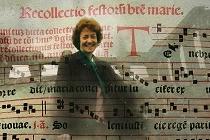Discovering Something New in the Medieval
Feb 17, 2022
She may not have the brown fedora, khaki pants or whip, but even so, University of Maryland School of Music Professor Barbara Haggh-Huglo is in many ways the Indiana Jones of medieval musicology. She’s traveled from Belgium to Italy to Mexico searching archives and libraries for traces of forgotten centuries-old music, and has unearthed revelations that have changed what musicologists know about landmark composers.
Since publishing her first article in 1981, on German radio drama of the 1950s and ’60s, Haggh-Huglo has been exploring unknown corners of music history and theory, uncovering secrets about music and musicians that have rocked the musicology world. This spring, in a talk to the Belgian Academy of Sciences, she’ll present her groundbreaking research on a long-lived chant by a monumental composer, and push for an expansive series of concerts featuring that chant, choral music and pipe organ music across northwest Europe, which she hopes will direct funds toward the renovation of historic churches.
In recognition of the contributions Haggh-Huglo has made to her field, in November she was elected an honorary member of the American Musicological Society, the highest honor bestowed by the preeminent organization for musicologists, who study the history and theory of music.
Her interest in music and its history began early on. Haggh-Huglo’s father was a composer and music theorist who eventually became director of the University of Nebraska’s School of Music, and her mother was a trained singer. Her sister became a professional cellist, and while Haggh-Huglo played violin, her academic nature steered her toward musicology.
It wasn’t just her birth family that was immersed in music. Her late husband, Michel Huglo, was an esteemed musicologist who began his adult life as a monk in France’s Benedictine Abbey of Solesmes, famed for its study and practice of Gregorian chant. Though separated in age by 34 years, the two found common ground in their passion for the music of the past, and traveled across the globe together in search of the next great find. “We worked in libraries side by side and what I learned from him was of incalculable value,” she said.
Haggh-Huglo made her first game-changing discovery during research for her doctoral dissertation on the history of music in Brussels. After learning Dutch and French in order to read primary sources, she found music by renowned 15th-century choral composer Guillaume Du Fay. He’d written it in the entirely different style of Gregorian chant, the only such chant by a major composer of choral music. It’s this revelation that she now hopes will spur a new series of concerts in Europe.
Other musical discoveries have taken her to major sights around the world—including Buckingham Palace, where she met with Queen Elizabeth’s private secretary to present research on music commissioned for Saint Elizabeth of Hungary, an ancestor of the queen.
Haggh-Huglo uses a contemporary perspective to reflect on a musical world that can feel distant, said Rachel Ruisard Ph.D. ’21, who studied with her at UMD and now teaches musicology at Haverford College. Haggh-Huglo encouraged Ruisard to write her thesis on women’s songs from the 14th century, said Ruisard.
“She was really advocating for how important this topic was to talk about, because in the current discipline for this tradition, perspectives of women and considerations of gender really are not often discussed,” she said.
Still teaching courses on early music, its notation and theory, Haggh-Huglo finds refuge in a variety of music, including her new pipe organ kick. “I’ve learned the organ repertory in the car on the way to work,” she said. “That’s what’s gotten me through the pandemic.”





